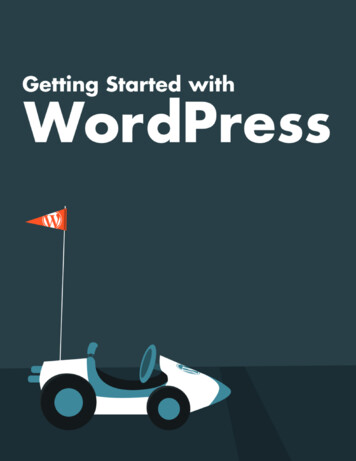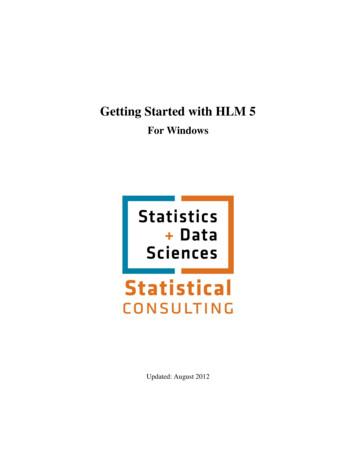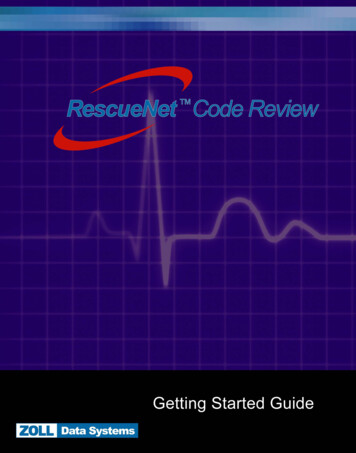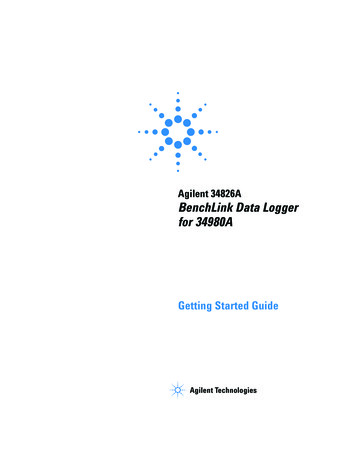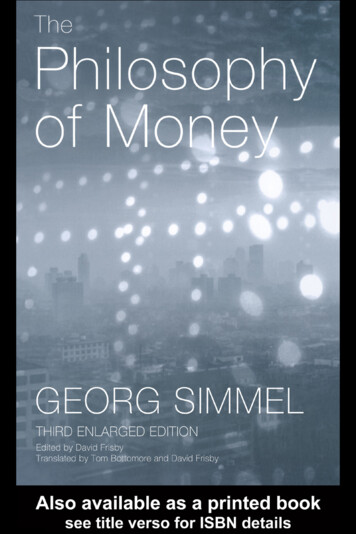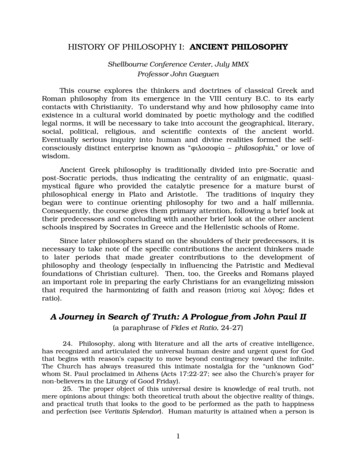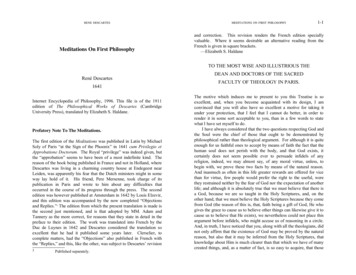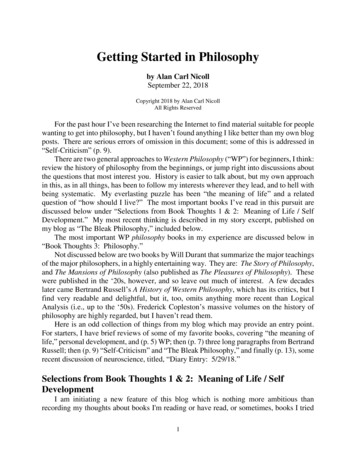
Transcription
Getting Started in Philosophyby Alan Carl NicollSeptember 22, 2018Copyright 2018 by Alan Carl NicollAll Rights ReservedFor the past hour I’ve been researching the Internet to find material suitable for peoplewanting to get into philosophy, but I haven’t found anything I like better than my own blogposts. There are serious errors of omission in this document; some of this is addressed in“Self-Criticism” (p. 9).There are two general approaches to Western Philosophy (“WP”) for beginners, I think:review the history of philosophy from the beginnings, or jump right into discussions aboutthe questions that most interest you. History is easier to talk about, but my own approachin this, as in all things, has been to follow my interests wherever they lead, and to hell withbeing systematic. My everlasting puzzle has been “the meaning of life” and a relatedquestion of “how should I live?” The most important books I’ve read in this pursuit arediscussed below under “Selections from Book Thoughts 1 & 2: Meaning of Life / SelfDevelopment.” My most recent thinking is described in my story excerpt, published onmy blog as “The Bleak Philosophy,” included below.The most important WP philosophy books in my experience are discussed below in“Book Thoughts 3: Philosophy.”Not discussed below are two books by Will Durant that summarize the major teachingsof the major philosophers, in a highly entertaining way. They are: The Story of Philosophy,and The Mansions of Philosophy (also published as The Pleasures of Philosophy). Thesewere published in the ‘20s, however, and so leave out much of interest. A few decadeslater came Bertrand Russell’s A History of Western Philosophy, which has its critics, but Ifind very readable and delightful, but it, too, omits anything more recent than LogicalAnalysis (i.e., up to the ‘50s). Frederick Copleston’s massive volumes on the history ofphilosophy are highly regarded, but I haven’t read them.Here is an odd collection of things from my blog which may provide an entry point.For starters, I have brief reviews of some of my favorite books, covering “the meaning oflife,” personal development, and (p. 5) WP; then (p. 7) three long paragraphs from BertrandRussell; then (p. 9) “Self-Criticism” and “The Bleak Philosophy,” and finally (p. 13), somerecent discussion of neuroscience, titled, “Diary Entry: 5/29/18.”Selections from Book Thoughts 1 & 2: Meaning of Life / SelfDevelopmentI am initiating a new feature of this blog which is nothing more ambitious thanrecording my thoughts about books I'm reading or have read, or sometimes, books I tried1
to read and gave up on. This is an attempt to make this blog something more dynamic thana place to store chapters of my books in progress.It's unclear to me how I'll incorporate this project into WordPress. For now I'll juststart with comments on my Best Books Ever list. At this point I don't plan to reread eachitem, but just to give my current thoughts about things I've read and loved, in some casesdecades ago. It is my intention to be brief and to avoid expressions like “Read thisbook!” All the books on my list seem to me potentially life-changing, and you neglectthese gems at your peril of leading a diminished life.Ralph Waldo Emerson: “Self Reliance”Emerson's Essays are generally rather dry and abstract, but this essay is evergreen. Thewriting is exceptionally vigorous and the thoughts are forceful and, at times, extreme. Ihaven't read the essay in years, but I've read it many times, and it's a short piece that I thinkmost people will find quite amazing.Leo Tolstoy: Confession (also published as My Confession)This short book has sometimes been anthologized, as in Walter Kaufmann'sExistentialism from Dostoyevsky to Sartre, an excellent book as well. Confession isTolstoy's story of his crisis of faith, his confrontation with the meaning—ormeaninglessness—of life. While his solution to his dilemma may please few modernreaders, especially atheists (of which I am one), the challenge is the important thing, andhe presents the challenge vigorously and clearly—true of Tolstoy's writing generally.Leo Tolstoy: War and PeaceIf you haven't read War and Peace, what are you waiting for? It is certainly the mostacclaimed of all novels. I recall Percy Lubbock's point that I am forced to paraphrase: ithas everything in it, and that's also its weakness. I will not add to, nor repeat, the carpingof critics. Tolstoy trained all subsequent generations of writers by his example, and thisbook contains many brilliant scenes. It has multiple excellent love stories, vivid picturesof war and its consequences, and enough reflections on life to form a separate book ofquotations. To me he is never dull, even when taking his main character, Pierre Bezuhov(or Bezukhov), through the lengthy rituals of Freemasonry, But I exaggerate: his theoryof history is beyond dull, and unpersuasive. It seems these days that the theory is confinedto an appendix or two, a choice of which I thoroughly approve. In the list it appears underthe title “Meaning of Life / Self Development” and I think that categorization is fullyjustified. It can be a life-changer.Grace Llewellyn: The Teenage Liberation HandbookI dearly love this book and have read it three times, starting in my forties. It is directedat teenagers, particularly those in public school, but it's excellent reading for persons of2
any age. What are you going to do with your life? What do you love? The book asks suchquestions and provides unconventional answers that people have tried. This approach isboth entertaining and liberating, and every teen deserves to receive a copy when she entershigh school, if not before. Parents be warned: your teenager, if she reads this book, willvery likely tell you that she wants to “quit school and get a real life and education,” whichis most of the subtitle of the book. For any teen who is chafed or worse by her schoolexperience, this book could literally be a life saver. If you're beyond high school yourself,this book may encourage you to change jobs and pursue what you've always dreamtof. Many books talk in terms like these; this happens to be the one I've read and greatlyagree with.Lin Yutang: The Importance of LivingDr. Lin here presents his idea of the philosophy of Chinese peasant women, if Iremember correctly. The first time I read this book I thought it was about half nonsenseand half stimulating, interesting, even weird, ideas. The second time I read it I thought itabout 5% nonsense and the rest just fabulously interesting ideas. He starts with an analysisof the character of the people of various nations; this is anything but “politically correct,”but I find some unfamiliar truths here. In any case, don't let a distaste for this beginning toturn you off to the book as a whole.As an aside, Dr. Lin also wrote a book late in life called From Pagan to Christian, inwhich he describes his change in belief. Other books of his that I've read have all beinteresting and entertaining, but the above is the important one. It went through manyreprintings in the 1940s and was incredibly popular at the time. It deserves to be betterknown these days. Don't take my word for it--read the raves on Amazon.com. Or checkout the extensive quotes in my Collected Quotations.John C. Holt: Freedom and BeyondThis book presents a perhaps naïve view of progressively-oriented economics; since Iam not smarter or more educated in economics than Holt, I can't really address thateffectively. I can say that this book is the first that got me excited about economicjustice. We have the world's richest most successful economy, yet when it comes to the“blessings of society” and mere “happiness,” we are well behind other developedcountries. Holt decries this. Here's what I wrote about this book in 1993: ”An astonishingand important book. Full of stunning insights into American society. Especially good reeducation, but also mind-changing ideas about our economy and institutions. Reread thisone often! Make it your own.” The second time I read this book, in maybe 2010, I was lessenthusiastic, in part because I had learned Holt's lessons.3
Henry Thoreau: WaldenWhat can I say about a book I've read a scarcely-credible 22 times? Henry speaks of“modern man” as observed by him in the 1830s and ‘40s, with special reference to work(the first and longest chapter is called “Economy,” referring to a single person's incomeand expenses). It’s a book that every young man should read, though perhaps not withouta mentor. I first read it at seventeen and learned the wrong lesson. Thoreau reinforced mygrowing belief that normal adult life was bullshit. Thoreau’s point was to reduce expensesso you could reduce the work needed; instead I heard, “Avoid a nine-to-five job” or maybeeven “Avoid work altogether.” He advocated a simple life of leisure; unfortunately, Ilearned only the leisure part of the lesson, not the more important point of living simply toreduce expenses. Thoreau was no hobo, nor was he the completely self-sufficientindividual we wish he'd been; rather, he had support from his family that receives littlemention in the book. He could not have lived on the food he grew because he was thelaziest of farmers. Despite the defects of his practice of his theory, his theory is bothrefreshing and challenging. In addition, his prose is both funny and beautiful byturns. Some day I'll write a long essay about this book; this is not the time. Availableonline for free, but I'd recommend an annotated version, of which some are availablethrough your local library. I prefer Cramer's.Henry Thoreau: EssaysHenry's “Civil Disobedience” is justly celebrated for its influence on MohandasGandhi and Martin Luther King, Jr. It may nourish the rebel in you; it will certainlychallenge the citizen you are (if you are). Briefly, he refused to pay his poll tax for reasonshe explains, and as a result he spent a night in jail. We live in a less forgiving age. Hisother essays tend to be digressive, breezy, and chatty since many were originally given aspublic lectures. They are also serious, thoughtful, and personally challenging for thereader. The essay “Life Without Principle” seems to me a “little Walden.”Derrick Jensen: A Language Older than WordsJensen's book is entertaining and loaded with exciting ideas, but some of the things hesays, for me, “do not compute.” For instance, I find it rather incredible that he expects thereader to take seriously his claim of communicating with coyotes, trees, and stars. Somereaders will perhaps find these things to be the most valuable parts. I certainly didnot. However, like Thoreau, Jensen advocates shunning a standard “job” and instead doingsomething which will nourish the deeper part of you. I read the book twenty years ago andcan remember few other details; fortunately, I have some extensive quotations inmy Collected Quotations (surely a violation of copyright). I cannot recommend Jensen’sother works and opinions—my one glimpse suggested he’s advocating anarchy and/orviolent revolution, for which I have no use.4
Plato: Apology, Crito, PhaedoPlato's Apology is a foundational document of western civ, the story of the trial anddeath of Socrates. Crito and Phaedo continue the story. If you're leading an “examinedlife,” you should know that Socrates gave us the idea. In addition to raising criticalquestions about man's place in society, these three dialogues are also emotionally powerfulreading.Viktor Frankl: Man’s Search for MeaningFrankl is the originator of Logotherapy, which aims to solve a patient's psychologicalproblems by improving his view of the meaning of life. Frankl's view of the meaning oflife is, essentially, what gives one's life meaning is how one responds to suffering. I findthis uninspiring, but the book has more than this. Frankl was confined in a Germanconcentration camp with his father; he survived, his father didn't. The story of thisexperience occupies the first half of the book, while in the second half the author explainshow that experience made him see that the survivors of the camp had a strong sense of themeaning of their life, while those who succumbed to the horror did not.Walter Kaufmann: The Faith of a HereticKaufmann's book is an examination of his personal beliefs in light of hisatheism. Many books about atheism have been popular in recent decades; this is decadesolder and was the most important to me in informing my own beliefs. Kaufmann is notedas a translator of German literature, notably almost all the works of FriedrichNietzsche. He also was a philosopher, though not a generally important one. I thoroughlyenjoyed many of his books, which are listed in the Kaufmann Wikipedia article. I lostenthusiasm when reading his Discovering the Mind trilogy, which I found embarrassinglywritten. This book, however, remains excellent, almost required for thoughtful atheists.Book Thoughts 3: PhilosophyI'm no philosopher, and philosophy is among the most difficult and technical ofsubjects. I started reading philosophy when I was 26 (now 71), beginning with BertrandRussell's Unpopular Essays. I could hardly have been luckier than to start with thisbook. Later I took a few philosophy courses at U.C. Irvine, at a time when I was muchimpressed with A. J. Ayer's Language, Truth, and Logic. The following opinions arepenned by a layperson, and can hardly be considered definitive or even defensible,philosophically speaking.William Barrett: Irrational ManCurrently rereading this with a friend and providing discussion questions; this maybecome a thing if any others show interest. This book gives an overview of existentialism,5
as of 1958. The introductory chapters tend to get a bit vague, in a woolgathering way, withmany casual (and undefined) references to the human spirit and the like. But hisdiscussions of Kierkegaard, Nietzsche, Heidegger, and Sartre are well worthreading. When I first read this book, I knew nothing of existentialism. Now, decades later,I am in a better position to evaluate it. (Stay tuned)Bertrand Russell: The Problems of PhilosophyRussell is the most readable philosopher I know of; even when he gets technical, hedoesn't get unnecessarily technical or obscure. This book is deceptively simple. It beginsby analyzing sense perceptions, as so many philosophers have done, and makesobservations and draws conclusions which will be surprising to the neophyte, but mostlycommon sense to the experienced philosophical reader. As such, it's a brilliant introductionto philosophy, with the emphasis on epistemology, apparently Russell's favoritesubject. It's the one book by Russell that was included in the Great Books of the WesternWorld, Second Edition. Readers who get through this short book may want to tackle amuch more challenging and technical book of epistemology by Russell, An Inquiry intoMeaning and Truth. In my Collected Quotations are three long quotes from Problems,plus my brief review from 2001 (see below).Friedrich Nietzsche: Beyond Good and EvilI've read all of Nietzsche's major books at least once (excluding The Will to Power,which is a collection of notes) and most of them are well worth your time. I think this ishis best and most important book, as well as being far more readable and interesting thanhis most popular, Thus Spake Zarathustra. It is his one book in the Great Books of theWestern World, Second Edition, a good indication that it's probably important to WesternCiv. It's not easy to summarize, however; the Wikipedia article does a better job than Icould. You'll find this one by turns profound and obscure and outrageous; it's also, likeNietzsche often is, very quotable. Not in my “Collected Quotations,” however.Ludwig Wittgenstein: On CertaintyWittgenstein is tough to read. Most people trying to get into him start withhis Tractatus Logico-Philosophicus, a book which is far too much like Euclid for my tasteand patience. On Certainty is relatively obscure by comparison, but it looks atepistemology in a way that is unique and especially entertaining andinteresting. Wittgenstein's Philosophical Investigations is undoubtedly more important tothe history of philosophy (and it's in the Great Books), but that one puts me to sleep. Thisone I've read I think three times and I enjoyed it every time.6
Thomas Nagel: “Subjective and Objective” (in Mortal Questions)This brief essay seems to me to give definitive answers to many important questionsin epistemology. Many of the most intractable philosophical questions revolve around thedifference between two viewpoints. For example, looked at subjectively, nothing is moreimportant (to me) than my life; looked at objectively, nothing is more trivial because in afew years it will be as though I never lived. Philosophy of mind is another area where thisis at the heart of the matter: I know that I have a mind, but if one studies the brain, it lookslike “nobody's home.” Nagel offers a way to look at such questions; as far as I can tell,nobody is satisfied with his answers, including me. But they were convincing at one time,and this essay will advance your philosophical sophistication, even if the answers are notthe final ones.George Lakoff and Mark Johnson: Philosophy in the FleshHow does it happen that we can understand anything? Why can we understand wordsat all? Lakoff and Johnson provide the only answer to such questions that is evenconceivable to me: we understand words physically. We are biological, living bodies; thisfact forms our minds as we behave in the world. Unfortunately, the book is huge, andrather tedious; but you don't have to read the whole thing (I didn't) to the get very valuable(to me) nugget of this point of view. If you're interested in cognitive science orneuroscience or psychology, you really want to make the ideas in this book part of yourtools for thought.Daniel Dennett: Freedom Evolves and Elbow RoomDennett is one of the most popular of current big brains, and rightfully so. His booksare chock full of surprising insights and thought experiments. This is one his books on freewill, on of the toughest philosophical questions around. Unfortunately, I just can'tremember if this is the book I think it is, or if his Elbow Room is the book I'mremembering. Eventually I'll settle this question and . you know.Question settled: It's Elbow Room that so impressed me. It's also about ten yearsnewer than Freedom.Quotes from Bertrand Russell: The Problems of Philosophy, OxfordUniversity Press, London, 1912.“The value of philosophy is . . . to be sought largely in its very uncertainty. The manwho has no tincture of philosophy goes through life imprisoned in the prejudices derivedfrom common sense, from the habitual beliefs of his age or his nation, and from convictionswhich have grown up in his mind without the co-operation or consent of his deliberatereason. To such a man the world tends to become definite, finite, obvious; common objectsrouse no questions, and unfamiliar possibilities are contemptuously rejected. As soon as7
we begin to philosophize, on the contrary, we find . . . that even the most everyday thingslead to problems to which only very incomplete answers can be given. Philosophy, thoughunable to tell us with certainty what is the true answer to the doubts which it raises, is ableto suggest many possibilities which enlarge our thoughts and free them from the tyrannyof custom. Thus, while diminishing our feeling of certainty as to what things are, it greatlyincreases our knowledge as to what they may be; it removes the somewhat arrogantdogmatism of those who have never travelled into the region of liberating doubt, and itkeeps alive our sense of wonder by showing familiar things in an unfamiliar aspect.“Apart from its utility in showing unsuspected possibilities, philosophy has a value—perhaps its chief value—through the greatness of the objects which it contemplates, andthe freedom from narrow and personal aims resulting from this contemplation. The life ofthe instinctive man is shut up within the circle of his private interests: family and friendsmay be included, but the outer world is not regarded except as it may help or hinder whatcomes within the circle of instinctive wishes. In such a life there is something feverish andconfined, in comparison with which the philosophic life is calm and free. The private worldof instinctive interests is a small one, set in the midst of a great and powerful world whichmust, sooner or later, lay our private world in ruins. Unless we can so enlarge our interestsas to include the whole outer world, we remain like a garrison in a beleaguered fortress,knowing that the enemy prevents escape and that ultimate surrender is inevitable. In sucha life there is no peace, but a constant strife between the insistence of desire and thepowerlessness of will. In one way or another, if our life is to be great and free, we mustescape this prison and this strife.“One way of escape is by philosophic contemplation. Philosophic contemplation doesnot, in its widest survey, divide the universe into two hostile camps—friends and foes,helpful and hostile, good and bad—it views the whole impartially. Philosophiccontemplation, when it is unalloyed, does not aim at proving that the rest of the universe isakin to man. All acquisition of knowledge is an enlargement of the Self, but thisenlargement is best attained when it is not directly sought. It is obtained when the desirefor knowledge is alone operative, by a study which does not wish in advance that its objectsshould have this or that character, but adapts the Self to the characters which it finds in itsobjects. This enlargement of Self is not obtained when, taking the Self as it is, we try toshow that the world is so similar to this Self that knowledge of it is possible without anyadmission of what seems alien. The desire to prove this is a form of self-assertion, and, likeall self-assertion, it is an obstacle to the growth of Self which it desires, and of which theSelf knows that it is capable. Self-assertion, in philosophic speculation as elsewhere, viewsthe world as a means to its own ends; thus it makes the world of less account than the Self,and the Self sets bounds to the greatness of its goods. In contemplation, on the contrary,we start from the notSelf, and through its greatness the boundaries of Self are enlarged;through the infinity of the universe the mind which contemplates it achieves some share ininfinity.” p. 157-159Book review: A brilliant, brief introduction to epistemology. Offers sound reasoningon difficult subjects, and so would be a good introduction to anyone wanting to get intophilosophy, though with one caveat: one is liable to say, on finishing it, “that's all very8
nice, but what does it have to do with me?” That is, there is no consideration of practicalquestions, such as are the heart of books like Dr. Lin Yutang’s Importance of Living orWalter Kaufmann's Faith of a Heretic. In other words, it does not deal with questions like,how should I live? This is abstract philosophy of a high order, yet it is very readable andcomprehensible. An important book, really a classic. 4/18/01Self-CriticismMy focus here is almost entirely on Western philosophy (“WP”), completely ignoringthe vast riches of the Eastern traditions. While I have made some explorations intoConfucius, Lao Tzu, Alan Watts, Buddhism, and such, I don’t want to try to address thisright now. Alan Watts especially has been important to me, probably more important thanI know, because I’ve been listening to his lectures on the radio for most of my adult life,as well as reading a number of his books. Regrettably, I am not in a position to recommendany one book.Also missing here is any consideration of women. Few women have attainedsignificant reputations (that I’m aware of) in WP, so I have nothing to offer. I welcomesuggestions.The Bleak PhilosophyThe following is extracted from the first draft of a science fiction novel that I call, YouHave No Right to Remain Silent. At this point it seems highly unlikely that I’ll ever finishthe novel. However, this little speech and discussion is the closest I’ve come so far towriting a connected, coherent explanation of my philosophy. In reading this, you shouldimagine a middle-aged man addressing a room of about twenty assorted persons, sixtyyears from now. So, without further ado:“Welcome, newcomers and fellow bleaks. I am Robert Montes, but everyone calls me‘Padre,’ maybe because I was called that when I was an altar boy. It was a joke then, andmaybe it is now, I don’t know. I’ll also answer to Robert, but if you say ‘Hey, Bob,’ I’mlikely to look behind me.”“The foundation of bleak philosophy is to combine the best elements of existentialismand General Semantics, both rather technical subjects. Sartre said that existentialism wasthe result of taking atheism seriously. The bleak philosophy is the result of takingneuroscience seriously.”He takes a small card from his shirt pocket. “I want to read you a quote from BlaisePascal, who lived in the seventeenth century. He said, ‘I see those frightful spaces of theuniverse which surround me, and I find myself tied to one corner of this vast expanse,without knowing why I am put in this place rather than in another, nor why the short timewhich is given to me to live is assigned to me at this point rather than another of the wholeeternity which was before me or which shall come after me. I see nothing but infinities on9
all sides, which surround me as an atom and as a shadow which endures only for an instantand returns no more. All I know is that I must soon die, but what I know least is this verydeath which I cannot escape.’ Powerful words.”“Pascal’s questions go to the heart of what it means to be human, to be alive. Hebelieved that he was a soul, an immortal soul temporarily housed in a body, and so hewonders, why this body? Why now? This is a thinker’s question, a question which occursonly to persons who have time to think, and perhaps only to those who question or rejectthe answers they grew up with—in my case it was a version of Christianity which I nolonger respect, if I ever really did.”“If Pascal had thought of himself not as a soul, but as a body, he would not have hadthese questions. Now, to make troubling questions go away is not a good reason to changeyour religion, your beliefs. But if you discover that your beliefs are unreasonable,irrational, not as good as other beliefs you might have, then you do have good reasons tochange.”“Science does not accept the existence of souls, as I see it—and everything I’m sayingtonight is only my opinion—science does not accept the existence of souls for two reasons.First, there is no good evidence that souls exist. Some people believe in ghosts, and thatghosts are souls, but both science and most religions reject belief in ghosts. The secondreason that science rejects the existence of souls is that souls explain nothing. These twopoints could be argued about for a long time, and perhaps one day I’ll go into thosearguments in detail in a lecture. Tonight my purpose is not so ambitious. Tonight I wantto concentrate on what it means to be Bleak. Because Bleak is the name my religion hasacquired, it’s a nickname that has stuck, for better or worse.”“Modern science tells us that we are essentially just very smart animals. We are notsomething very different from chimpanzees or dolphins or cats. We have somewhatdifferent brains, is the important difference. And as Daniel Dennett said earlier thiscentury, the more you know about brains, the more it looks like nobody is home. What wecall the mind is just the activity of mindless neurons housed in a complicated body. Themind is brain-body activity, and there is no other thing like a soul that tells the brain whatto do.”“Again, I can’t expect you to be persuaded by the few words I’ll say to you tonight.To understand and believe the bleak philosophy is not the work of an afternoon or even ofa year. Without a firm belief in the methods and results of science, there’s hardly any pointin even talking about it. But with a firm belief in the methods and results of science, you’rewithin spitting distance of being a bleak. You’ll believe that the earth is a speck of dustamong countless others, you’ll believe that we are all the descendants of apes, you’llbelieve that when the brain is dead the person is dead, and there’s an end. People call thesefacts ‘bleak,’ and in comparison to the fantasies of a heavenly afterlife in the lap of a lovinggod, they are. But there are reasons not to turn your mind away from hard realities, reasonswhich I probably don’t need to spell out. Given that Bertrand Russell did such a wonderfuljob of it in his A Free Man’s Worship a hundred years ago—we have a pamphlet of thatessay available.”10
“One of the hardest things for people to accept is that people are bodies, not minds.We tend to believe, we grow up believing, that it is natural to believe as Descartes did: ‘Ithink, therefore I am.’ We take this for granted. Why question it?”“However, another thing we take for granted is that changing the brain changes themind. A drink of alcohol or a dose of marijuana changes how a person feels and how shebehaves. These things don't affect the mind directly—they change the actions of neurons,and neural activity is what we experience as the mind. Another long argument for a rainyafternoon, perhaps.”“The mind is a curious, mysterious, slippery thing, which is kind of what you shouldexpect of the doings of a hundred billion little machines. We tend to think that we knowour own minds, but serious thought reveals how little we really understand, even today.”“For example, consider free will. I can, of course, choose to raise my left arm. Butwhen I try to see that choice being made in my mind—try this at home some time—I seethat the choice comes from a dark place into which I cannot see. In fact, all of our
“Book Thoughts 3: Philosophy.” Not discussed below are two books by Will Durant that summarize the major teachings of the major philosophers, in a highly entertaining way. They are: The Story of Philosophy, and The Mansions of Philosophy (also publishe
